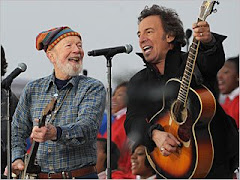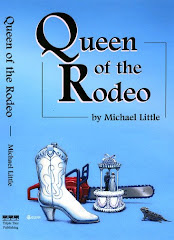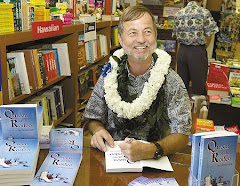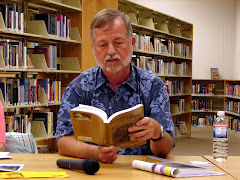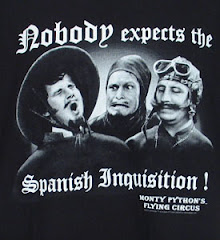Tuesday, December 30, 2008
Caroline Kennedy and verbal tics
Saturday, December 20, 2008
Christmas news from Wasilla
As I reported earlier, my friend Richie from up the street hasn’t gotten over his fascination with Sarah Palin. Even with the November election fading in the rear view mirror. It’s not that he agrees with everything she says, or even anything she says. He just can’t stop obsessing, anymore than he could ever stop bringing beer over to my place and watching NFL football on the big screen.
Just last Sunday I’m talking about Peyton Manning and the Colts, and how the amazing Peyton’s come back from his injuries to lead his team to the playoffs after a bumpy start, but I look over at Richie and he’s put his beer down and is gazing off into space.
“I wonder what Sarah’s doing this weekend?” Richie says, as if he’s talking about a mutual friend that he hasn’t seen for a few days.
“What?” I say, my discourse on Peyton’s stellar season interrupted. Then, to tease him, I say, “Sarah who?”
“Palin, you idiot,” Richie says, as if there’s only one Sarah in the world. “She hasn’t been in the news for a few days. I blame that crazy governor in Illinois, that’s all the news guys want to talk about.”
“Blagojevich,” I say. “The guy’s name is Blagojevich. And it’s big news. He tried to sell Obama’s Senate seat to the highest bidder. And his approval rating is lower than Bush’s, which isn’t easy.”
“Whatever,” Richie says. “I wish he’d just go away. Him and that hairy critter that lives on top of his head. What a dork.”
“Say his name,” I tell him. “I bet you can’t pronounce it.”
“I could if I wanted. All I said was I wondered what Sarah’s doing. Don’t start talking about Blaga-boy-zich.”
“Close enough,” I say. “So what’s new with Palin? You’re the expert on the subject. Any news since she pardoned the turkey?”
“Oh, I almost forgot,” Richie says, and he fishes in his back jeans pocket and pulls out a folded sheet of paper. He gives me a smug smile and hands me the paper. “Read this. You know that Internet friend I made in Wasilla? I told you about him. Sam McGee. The mechanic. He sent me their family Christmas newsletter. It’s got all the news of the year.”
“All about Sarah Palin?”
“Well, some of it. Just read it.” Then he leans forward, gives me his serious look, and says slowly. “If you’re going to understand a person … especially if they’re different … it helps to know where they come from.” Then he sits back and adds, “Janine … that’s Sam’s wife … Janine wrote the newsletter.”
So I unfold the newsletter, admire the red and green Christmas border, and start reading. Richie interrupts me with “Read it aloud,” so I do. And here it is, the McGee Christmas newsletter. Enjoy.
Merry Christmas to all our friends and relatives, here in the Great Land and to all you poor suckers in the Lower 48. (Just joking.) It’s been a busy year for the McGee gang. In case you didn’t hear, I went to Anchorage in June to update my beauty shop skills. When I got back to Wasilla my regulars at the Magnificent Mousse were lining up. Got me some new customers too, which made Wanda happy.
Sam’s business is going good, even with the recession. Folks have to drive. Sometimes on my lunch break I walk over to the garage and watch him work and hand him his tools. It always reminds me of when we started seeing each other. He’d be working on my Ford, and I’d hand him a tool, and then a can of Bud, and then another tool … so romantic. Next thing I knew we were engaged.
Let’s see, what else is new? Well, the twins are at Wasilla High School now. Can you believe it??? It makes me feel old, but Sam always tells me I’m not getting older, I’m getting better. Then he gives me a tuneup … I mean my truck (ha!) … and I make him a good dinner, and we end up renewing our nuptials. I feel so lucky.
Oh yeah, the twins. Well, Cord is on the Warrior JV football team, so we’re just as proud as we can be. He’s keeping up his C average, so that’s good. He has a girlfriend, but I promised him I wouldn’t put her in the newsletter, but she’s cute as a bug and if you know who I’m talking about I’m sure you’ll agree.
Cora is likewise off to a good start in high school. Her main goal is to make cheerleader, but we told her to concentrate on the books during her freshman year, which didn’t go over big but she understands, and we promised her we’d do everything to help her make cheerleader next year. Well, not everything. Not like that psycho cheerleader mom in Texas. But we are practicing every night in the family room, after her homework’s done, and I’ve been passing on my own tips from the time I was head cheerleader at WHS. Cora doesn’t have a boyfriend at the moment. Her dad is being very protective, if you know what I mean, but I just tell Cora to be patient and someday she’ll be head cheerleader and have a quality boyfriend, so she’s very hopeful.
I know that everybody is curious about Sarah Palin, because that was the big news in town this year, so I’ll just tell you some stuff here in the newsletter and please don’t ask me about her all the time. Well, where to start? She was the mayor here, of course, and there were folks who liked her (she did get elected) and folks who didn’t. And then she made Governor but she still kept her home in Wasilla, and there were folks who liked her and folks who didn’t. Then she ran for Vice President (oh my God, that was exciting), and there were folks who liked her and folks who didn’t. Of course you see her around Wasilla. She’s just folks. Except that Sam and I don’t have bodyguards. I don’t have her wardrobe. Wanda used to do her hair, but that was before I started at the shop. All Wanda says about Sarah’s hair is “there’s a lot to work with.” She has a rule that we don’t talk politics or religion in the shop. But it is OK to talk about everybody’s hair. And nails.
OK, I’m out of room here, so I’ll just wish you all a Happy New Year. Hang in there in 2009 and we’ll all get through these hard times. Remember, you’ve always got your family. And the Good Lord will provide.
Love,
Janine
P.S. Sam says there’s a tuneup special on at the shop, to the end of December (for those of you who are in town).
I fold the newsletter and hand it back to Richie. “Thanks for sharing,” I tell him. He says “glad to do it.” We go back to watching the game. I’m hoping that there won’t be any news flash interruptions from Illinois. Richie might explode.
Tuesday, December 2, 2008
Richie's big dilemma
After the longest year of my life, following the Presidential campaigns on TV, watching about a thousand debates, listening to Obama and Hillary and McCain and all those other guys, not to mention all the TV commentators who sometimes told us something we didn’t know but mostly just argued with each other. Richie would watch the arguments and hope for a fight to break out, maybe a few chairs being thrown around, and he said that Keith Olbermann could take Pat Buchanan out in about 30 seconds, but it was only arguing, and no chairs ever got thrown.
Whenever a debate was on, Richie would show up at my door, bringing a cold six pack and a newly acquired passion for politics. I never heard everything they said in the debates because Richie would be talking about promoting celebrity fights between the candidates. He would wonder out loud what would happen if you put, say, Hillary and Barack in the same ring, or maybe in one of those cages, and no rules. I’d tell Richie that Barack was younger and more athletic, and Richie would insist it wouldn’t be a basketball game, that Hillary would be tougher and would bite and claw, and then I’d point out that Barack was quicker and had a longer reach, and Richie would say that Hillary would have pointed shoes and would know how to use them, and then I’d give up and start listening to the debate again, and Kucinich would be talking about UFOs, and then Richie would ask me who I thought would win if they put Kucinich in the ring with an alien. And so on.
Then at the end of August that McCain guy surprised us all by naming a woman as his running mate. And not just any woman. We heard her name, Sarah Palin. Then we saw her photo (Richie studied the photo, then sat back and said "Desperate Housewives"). Then we began to learn things about her, like she was a runner-up for the Miss Alaska beauty queen, and mayor from a small town we’d never heard of. And then we heard her speak. We heard that voice, for the first time. She was folksy, all right, talkin’ county and droppin’ those g’s left and right. I looked over at Richie and his jaw had dropped and his eyes were big and I asked him if he was all right and he didn’t say anything. I think what he was was hypnotized.
So all through September and October, as the general election got closer and the campaign more heated, Richie focused on Sarah Palin. He read everything he could about her. He showed me her photos as a high school basketball player, and beauty contestant, and hunter. He showed me the fake photo from the Internet, with Sarah Palin’s head on the body of a well endowed woman in a bikini. I think he carried that one around in his wallet.
Richie stopped talking about celebrity fights. We agreed early on that Obama would take out McCain, in the ring or in an election. In fact, we were both big fans of the tall skinny guy from Hawaii with the funny name and the great jump shot. Richie and I, and I think all of our friends, were backing Obama. We had stood in line for over an hour in the spring to vote for him in the Democratic caucus. Richie had even looked up the word “caucus” and told me “It turns out it has nothing to do with the word ‘circus’ after all.” But when we finally got into the caucus room at Jefferson Elementary to vote for Obama, they had run out of ballots and we had to write on blank sheets of paper, once we found out which table was ours, and it was crowded and noisy and exciting and, now that I think of it, a caucus actually is like a circus.
All that was B.S., of course. Before Sarah. Before Richie got obsessed with the woman and Tina Fey started playing her on Saturday Night Live and cracking us up. Before the interviews, and Sarah telling us how she could see Russia from her house and how Putin rears his head and comes into the air space, and Richie saying they must be looking at each other a lot, and I thought he seemed just a bit jealous when he said it.
So anyway, November 4 finally arrived, and Richie drove the mile to Sacred Hearts, where we always vote, and we parked next to the Kaimuki Longs, which is right across the street, and soon we were in the voting booths, filling in the little boxes next to the ones we liked. The ballot was pretty short and it took me about three minutes to vote. Then I fed my ballot into the machine and looked around for Richie. I spotted his slippers and skinny legs beneath the half curtain of one of the voting booths. He was shifting his weight from one leg to the other. I moved closer, and that’s when I heard the noises from his booth. “Hmmmm.” “Arggggggggg.” Then I thought I heard “Shit!”
“Hey, Richie,” I said, “are you all right in there?” The only response I got was “Double shit!” That was a new one anyway. “Richie, you okay?” I said, this time louder. No answer. Finally I looked around, ready to explain that my friend needed help, in case anyone wondered, but nobody did, so I pulled the little curtain aside and squeezed into the booth with Richie.
“This sucks, man,” Richie said.
“What sucks? Having trouble with the constitutional amendments or board of education?” We were both kind of whispering.
“No, man,” Richie said, “I’m still on the President. I’m stuck, man.”
“What do you mean? Gotta be Obama, right?”
“Well yeah, Obama, sure. Obama, absolutely. But they don’t let you vote for a different Vice President. It’s gotta be that Biden guy if I vote for Obama. It’s like they’re joined at the hip or something.”
“Biden’s okay,” I said.
“But he’s not …” Richie’s whisper trailed off. Then it hit me. I’m slow sometimes, but eventually I catch on.
“He’s not Sarah,” I said.
“Damn straight,” Richie said. “And if Sarah doesn’t win, she’ll go back to Alaska and we’ll never see her again. She’ll be out of my life. I mean our lives.”
I put a hand on Richie’s shoulder. “It’s okay, dude,” I said. Richie likes to be called “dude.” “You know, dude, you’ll see her again. She’ll be around. I bet once this thing is over she’ll be on her own and twice as …” I searched for the right adjective.
“Twice as special,” Richie said.
“Sure,” I said. “Special” was not the word I was looking for, but if it helped me talk Richie down it would do.
Just then Richie poked his head out of the booth and called to one of the workers for help. The woman patiently explained to him that no, he couldn’t split his vote, that the running mates were tied together, and Richie said “joined at the hip,” and the woman laughed and said “now you’re catching on,” and Richie thanked her and turned back to his ballot.
He let out a big sigh, and slowly filled in the little box next to Obama and Biden. Then he said, “Let’s go, I don’t want to vote for the other stuff.” He fed in his ballot, and then, as we walked to the car, I patted him on the back and reassured him that we hadn’t seen the last of Sarah Palin. Richie asked me if I thought she would keep talking and be on TV, and I told him I didn’t think anyone could stop her. And Saturday Night Live would be grateful.
“Maybe one of those reality shows,” Richie said. “Or a talk show of her own.” We climbed into his car and, before he started the engine, Richie turned to me and said, “Who do you think could stop her from talking? Maybe Hillary? Now that would be a fight. Maybe in a cage. People would pay thousands of dollars for a ticket. And we could watch it on your big screen TV. I’ll bring the beer.”
By the time we pulled into my driveway Richie’s mood had brightened considerably. He was ready to watch the election results from the mainland. Ready to cheer for Obama. Knowing now that he could have it both ways. Barack and Sarah on the big screen TV, tonight and beyond. Richie reached into his pocket for his lucky bottle opener. Life was good again.
Monday, September 29, 2008
the metaphor that ate my brain
There it was, on page two of the Island Life section, right next to Sylvia (“The woman who somtimes lacks empathy can always dredge up a bit for France”), and Annie’s Mailbox (“Woman finds her job unfulfilling, considers Air National Guard”), and the daily drama of advice for bridge players (“‘East opened,’ Louie said plaintively; ‘why not take the heart finesse?’”), and the latest Sudoku (reminding me once again why I didn’t major in math), and the New York Times Crossword (54 down, three letters, “___ vindice” [Confederacy motto], reminding me once again why I didn’t major in Latin).
If I do decide to follow the advice and peel an eye on business, shouldn’t I keep my feet on the ground, or at least on the deck? But no, it has to be from your personal crow’s nest. Dammit, I don’t have a personal crow, and if I did I would leave it alone in its nest. It’s at this point, I notice, that the metaphor begins to eat my brain.
Thursday, September 25, 2008
picture the ending
Writers spend a lot of time on their opening paragraphs, and rightly so. Then we stand on the corner, displaying our wares under a streetlamp, waiting for a reader (or agent, or editor) to drive by. When they slow down, or stop at a red light, we boldly slink out to the curb, holding the first manuscript page of our novel up to the car window, pointing to that first seductive sentence, the alluring opening paragraph, the irresistible hook that will charm them into opening the passenger door and inviting us in. Hooker and hookee, together at last in a kind of erotic literary eHarmony dream.
But—and I apologize if you wanted me to pursue this dream further—what about the final paragraph of the novel? How about that moment on page 324 when you’re exhausted from months of writing, and the plot’s resolved, and the characters have done about all the damage you can handle, and it’s time to end the damn thing? Do you have the creative energy and vision left to write a strong ending? After all the blood, sweat, and tears, maybe you owe it to yourself, and to your story, to write a great ending.
Let’s look at a few famous endings in fiction and see what we can learn. You’ll have your own favorite endings, the ones that have influenced your own writing, whether consciously or not, but these are some of mine.
At the end of Gone With the Wind, after a thousand pages of life with Scarlett and Rhett and friends, after all the triumphs and defeats, all the living and suffering and dying, what image does Margaret Mitchell leave us with? It’s Scarlett O’Hara alone, because Rhett Butler has just walked away from her life again, rejecting her at the end of a long dialogue scene in which the two revisit their past and current feelings. After Rhett disappears up the stairs, and out of her life again, Scarlett is left alone, and in these final moments of chapter 63, and the novel, we are inside the heroine’s mind. Here are the last two paragraphs.
With the spirit of her people who would not know defeat, even when it stared them in the face, she raised her chin. She could get Rhett back. She knew she could. There had never been a man she couldn't get, once she set her mind upon him.
"I'll think of it all tomorrow, at Tara. I can stand it then. Tomorrow, I'll think of some way to get him back. After all, tomorrow is another day."
And as I sat there brooding on the old, unknown world, I thought of Gatsby’s wonder when he first picked out the green light at the end of Daisy’s dock. He had come a long way to this blue lawn, and his dream must have seemed so close that he could hardly fail to grasp it. He did not know that it was already behind him, somewhere back in that vast obscurity beyond the city, where the dark fields of the republic rolled on under the night.
Gatsby believed in the green light, the orgastic future that year by year recedes before us. It eluded us then, but that’s no matter—tomorrow we will run faster, stretch out our arms farther. . . . And one fine morning—
So we beat on, boats against the current, borne back ceaselessly into the past.
E. B. White’s classic Charlotte’s Web, which opens with Fern saving the runt pig Wilbur from the ax, ends with a hymn to friendship. Wilbur tells Charlotte’s children about their mother, and White writes simply and beautifully of the passing of the seasons, and generations, on the farm. Wilbur’s farm. Home. This last image, of Wilbur happy and surrounded by friends, and remembering Charlotte, brings the book to a perfect end. The final paragraph is a lesson for writers in the elements of style, in the power of a few words:
Wilbur never forgot Charlotte. Although he loved her children and grandchildren dearly, none of the new spiders ever quite took her place in his heart. She was in a class by herself. It is not often that someone comes along who is a true friend and a good writer. Charlotte was both.
What about endings for short stories? I believe the same principles apply as for novels. Two of my favorite short stories are from Dubliners. Both end with what James Joyce called an epiphany, a moment of revelation and insight, “a sudden spiritual manifestation.” In Joyce’s “Araby,” the young narrator with a deep crush on Mangan’s sister makes a difficult journey to buy a promised gift for her at the Araby bazaar. The boy fails in his romantic quest, however, arriving as the bazaar is closing and without enough money for something nice. At the end of the story we see him in the darkness of the closing bazaar, as Joyce delivers the epiphany in one concluding sentence: “Gazing up into the darkness I saw myself as a creature driven and derided by vanity; and my eyes burned with anguish and anger.” Again, a sharp image of the central character, evoking strong emotion.
In “The Dead,” Joyce is at his best, writing a longer story with a deeper epiphany. It begins simply with Gabriel Conroy, the central character, attending a Christmas party thrown by his aunts, and ends dramatically with a scene between Gabriel and his wife, Gretta. After the party they ride out a snowstorm in a hotel room, where Gretta tells Gabriel that the song that moved her at the party was the song that a young man she once loved greatly used to sing, a man who died for love of her. Gretta lies crying on the bed, and finally falls asleep while Gabriel gazes out at the snow and experiences his spiritual moment of insight.
Generous tears filled Gabriel's eyes. He had never felt like that himself towards any woman, but he knew that such a feeling must be love. The tears gathered more thickly in his eyes and in the partial darkness he imagined he saw the form of a young man standing under a dripping tree. Other forms were near. His soul had approached that region where dwell the vast hosts of the dead. He was conscious of, but could not apprehend, their wayward and flickering existence. His own identity was fading out into a grey impalpable world: the solid world itself, which these dead had one time reared and lived in, was dissolving and dwindling.
A few light taps upon the pane made him turn to the window. It had begun to snow again. He watched sleepily the flakes, silver and dark, falling obliquely against the lamplight. The time had come for him to set out on his journey westward. Yes, the newspapers were right: snow was general all over Ireland. It was falling on every part of the dark central plain, on the treeless hills, falling softly upon the Bog of Allen and, farther westward, softly falling into the dark mutinous Shannon waves. It was falling, too, upon every part of the lonely churchyard on the hill where Michael Furey lay buried. It lay thickly drifted on the crooked crosses and headstones, on the spears of the little gate, on the barren thorns. His soul swooned slowly as he heard the snow falling faintly through the universe and faintly falling, like the descent of their last end, upon all the living and the dead.
So there we have it. Five endings, all with powerful images and emotions and focused on the central characters who have been at the heart of the story. Notice that these are examples of denouement—that often quiet, reflective period following the climax of the plot. The story has reached afterglow, the golden hour, the last light of day between sunset and evening.
When I’m writing a short story or novel, and have resolved the conflict, I find myself naturally writing by that last light of day, adding a short scene or paragraph that inevitably is influenced and inspired by dozens of favorite endings. As the cowboy rides off into the sunset, his battles won, what is he thinking? Perhaps he stops and looks back at the town and gives a final wave. Or maybe, just maybe, he turns and rides back into town and, without stopping, sweeps the blonde saloon girl off her feet, just when she feared she would never see him again. Now there’s an image I like.



